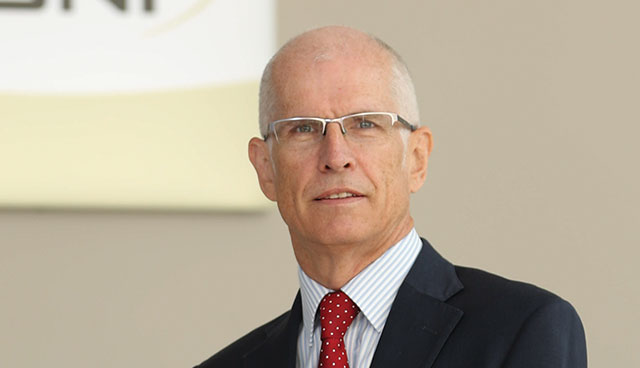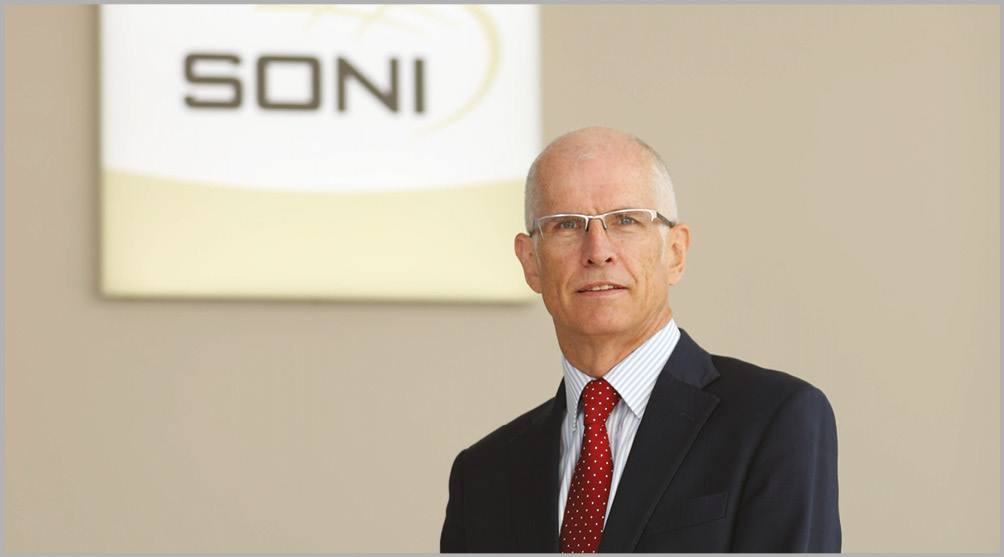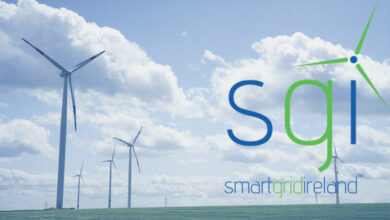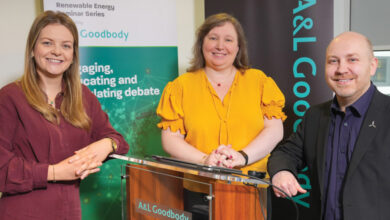Leading change today for energy tomorrow


The EU-SysFlex project, led by SONI (System Operator for Northern Ireland) and its sister company EirGrid in the Republic, has received funding to conduct research that will facilitate the large-scale integration of renewable energy and support EU plans for a greener Europe, writes Robin McCormick, General Manager, SONI.
This summer, a consortium of leading European energy companies, led by EirGrid Group which incorporates SONI and EirGrid, was awarded over €20 million by the EU to fund research into the deployment of renewable energy.
The wide-ranging project, known as EUSysFlex, is a very public acknowledgement of the ground-breaking work that SONI and EirGrid have carried out in this sector over recent years.
Our engineers have been working to meet the challenges of operating the electricity system while achieving high renewable electricity targets. The current levels of renewable energy are unprecedented and present significant challenges to the minute by minute operation of the power system.
In 2016, wind energy accounted for 25 per cent of all electricity consumed on the island of Ireland. That is the average figure; it sometimes increased to over 60 per cent of electricity consumption. This is a remarkable achievement by the engineers responsible for running the power systems across the island. This level of renewable energy is one of the highest in the world and is expected to rise to an average of 40 per cent by 2020 in order to meet government targets north and south.
The EU-SysFlex consortium will receive the funding under Horizon 2020, the EU’s €80 billion research and innovation programme. EirGrid Group is the overall project coordinator with French electricity group EDF acting as technical co-ordinator. The four-year project involves 34 organisations from 15 countries across Europe. It underpins European Union plans for a greener and more decarbonised Europe by increasing the levels of renewable energy.
Specifically, the aim of the EU-SysFlex project is to identify issues associated with integrating large amounts of renewable energy; provide practical assistance to power system operators across Europe; and identify a long-term roadmap to facilitate the large-scale integration of renewable energy. The project team will identify improvements to market design, power system regulation, operational practices and enhanced system tools.
The team will also trial solutions in concept labs to physically test potential energy scenarios. Furthermore, for the first time, a wide-scale model of the pan European system will be developed and deployed in training simulators. This will provide a long-term roadmap for how the EU can realise its renewable energy goals into the 21st century.
This has all come to pass on the back of SONI and EirGrid’s ‘Delivering a Secure, Sustainable Electricity System’ (DS3) programme, which was initiated in 2011. The aim of the DS3 Programme has been to meet the twin challenges of operating the electricity system in a secure manner while achieving 2020 renewable electricity targets.
The programme brings together many different strands, including development of financial incentives for better plant performance, and the development of new operational policies and system tools to use the portfolio to the best of its capabilities. The DS3 team of engineers is focused on helping deliver short and medium-term energy targets.
At SONI we analyse future electricity demand and plan ahead. We encourage a flexible and robust approach to grid development. This helps us to manage uncertainties and to be prepared for the changes of the future. It also allows us to better engage with our stakeholders by consulting at the earliest possible opportunity in our grid development process.
“At SONI we analyse future demand and plan ahead.”
We look at key influences on the future use of the grid in order to develop a strategic approach. This includes using our own experience and input received from government departments and agencies, research, industry representatives and bodies and the public.
Changes to the level of electricity demand have many contributing factors. Population growth, economic growth and, of course, the effects of weather are examples. Energy efficiency measures also help to reduce electricity demand. We consider these factors along with other variables such as the electrification of heating and transport with heat pumps and electric vehicles. We also look at the possibility of consumers moving their electricity usage at certain times of the day in order to reduce their energy bills.
As things stand we anticipate a relatively slow uptake of pure electric vehicles until 2025-2030. It is likely that hybrid vehicles will act as a transition between petrol and diesel vehicles to fully electric vehicles. From 2025 onwards, improvements in battery technology and decreasing capital costs of electric vehicles are expected to significantly increase the level of uptake.
We also consider a number of technologies for the electrification of heating in the future, including storage heaters, district heating and community-owned combined heat and power plants. We consider heat pumps to be the primary method by which heating will electrify in the years ahead. Heat pumps are used for space heating and cooling, as well as water heating and we assume that the majority will be installed in new buildings and housing developments. Heat pumps are more electrically intensive than electric vehicles.
The trend towards decarbonisation and reducing carbon output in the future will lead to reduced operating hours of large fossil fuel generators; therefore we examine possibilities for the future of coal, peat, gas and other fossil fuels.
The ‘All-island Generating Capacity Statement 2017-2026’, published jointly by SONI and EirGrid, forecasts the likely supply and demand during that period. A key aspect of the most recent report is the anticipated decommissioning of a significant amount of generating plant in Northern Ireland that, as things stand, will drive the system into capacity deficit after 2020. The commissioning of the proposed North South Interconnector project, currently in the planning process with a decision expected in the coming months, will alleviate these issues.
Finally, in terms of Northern Ireland’s energy and emissions targets, decarbonisation of the energy system is a trend we see continuing into the future as more renewable energy projects connect to the grid, particularly in the short to medium term. As is the case currently, wind and solar PV are likely to continue as the main contributors in Northern Ireland.
Robin McCormick is the General Manager of SONI. He is responsible for the operation and planning of the power system in Ireland and Northern Ireland. Robin is a fellow of the Institution of Engineering and Technology and the Institute of Directors.
SONI LTD
T: (0) 28 9079 4336
E: enquiries@soni.ltd.uk
W: www.soni.ltd.uk






